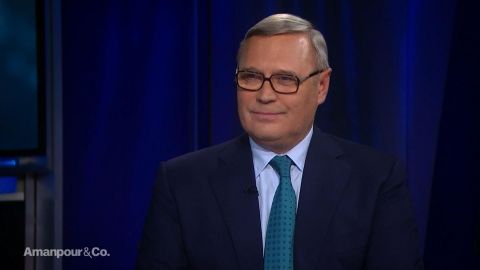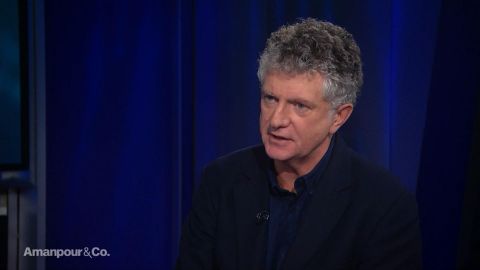Read Transcript EXPAND
CHRISTIANE AMANPOUR: Do you think that Boris Johnson has pulled off what Theresa May couldn’t?
JONATHAN POWELL, FORMER CHIEF OF STAFF TO U.K. PRIME MINISTER TONY BLAIR: Well, he sort of rather extraordinary journey of negotiation where he has, in fact, adopted something Theresa May originally accepted, the original backstop, which meant that Northern Ireland remained in the customs union in a single market. She went there to Brussels, sat with Jean-Claude Juncker, back to negotiations, was humiliatingly called back by the DUP, he said, no, you’re not going to do that, and she had to move off it. She said, in fact, no British prime minister could sign up for an agreement like that.
AMANPOUR: Can I play that sound bite?
POWELL: Please.
AMANPOUR: I’m going to play it and then we’re going talk about it.
(BEGIN VIDEO CLIP)
THERESA MAY, THEN-BRITISH PRIME MINISTER: The draft legal text the commission have published would, if implemented, undermine the U.K. common market and threaten constitutional integrity of the U.K. by creating a customs and regulatory border down the Irish Sea, and no U.K. prime minister could ever agree to it.
(END VIDEO CLIP)
AMANPOUR: So, I wanted to play it because you referred to it, but also, who was there in the background is foreign secretary, one, Boris Johnson, who was busy nodding —
POWELL: Yes.
AMANPOUR: — that, no British prime minister could agree to it, but now you say he is.
POWELL: He has agreed to it. He is a man of no particular fixed principles and he has no difficulty agreeing to something he’s contradicted before. But it does create his own problems. The good news is, by going into the single market in the customs union as originally proposed, we will avoid a hard border between Northern Ireland and the Republic of Ireland. That is good. That will help preserve the peace. The problem is, someone’s rights were always going to get trampled on. There has to be a border somewhere, because we’re leaving. Can either between Ireland, north and south, or between the rest of the U.K. and Northern Ireland? What he’s opted, because that’s what he could get from the E.U., is a hard border between Northern Ireland and the rest of the U.K., and that’s a big problem for the unionists. The unionist believe we should be a United Kingdom and they should be a part of it. They can’t have a hard border.
AMANPOUR: And you know those people very well because, in fact, you negotiated with them. The unionist — this particular unionist party, who formed the alliance with Boris Johnson in Parliament are actually really hardline. They didn’t even vote for the peace agreement, did they?
POWELL: They didn’t even come to Good Friday negotiations. In fact, the reason they came is to march with drums to protest against it. But they signed up later to it at St. Andrews. They basically accepted it later, but they weren’t there at the time. And they are hardline, but they are also unionists, and their rights have been trampled on by putting the hard border in.
About This Episode EXPAND
Mikhail Kasyanov sits down with Christiane Amanpour to explain Russia’s role in the situation in Syria. Nina Jankowicz joins the program to discuss Ukraine and the impeachment inquiry, and Jonathan Powell offers his perspective on the UK and EU’s new Brexit deal. Gulalai Ismail tells Michel Martin about her advocacy for human rights.
LEARN MORE



